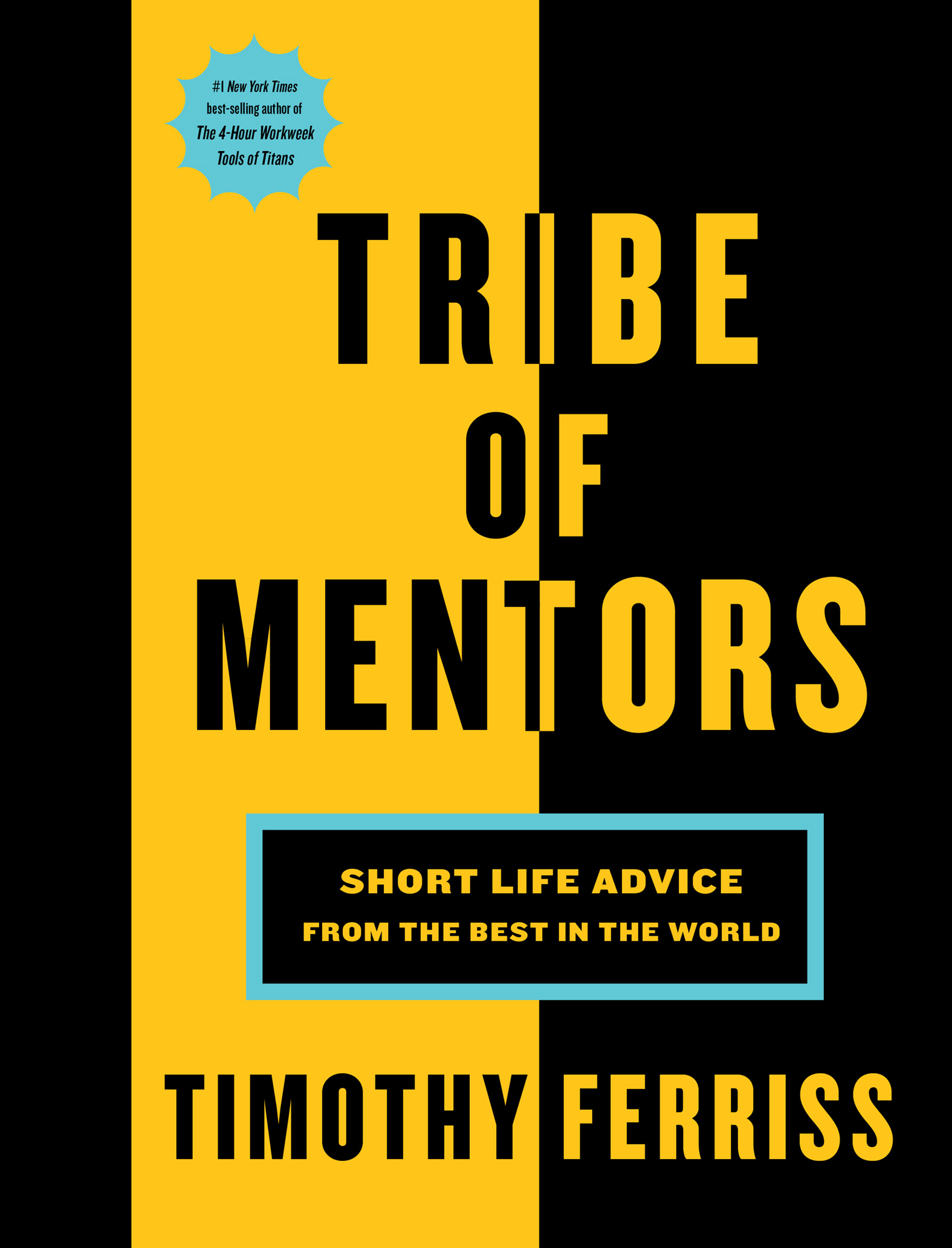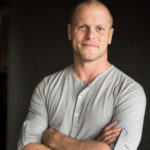In this excerpt from Tim Ferriss’ new book Tribe of Mentors: Short Life Advice From the Best in the World, Tim shares this advice: Ask a better set of questions. He proceeds to do so with 598 pages packed full of advice from leaders, entertainers, authors, experts and more.
Two thousand seventeen was an unusual year for me. The first six months were a slow simmer, and then, within a matter of weeks, I turned 40, my first book (The 4-Hour Workweek) had its 10th anniversary, several people in my circle of friends died, and I stepped onstage to explain how I narrowly avoided committing suicide in college.
Truth be told, I never thought I’d make it to 40. My first book was rejected 27 times by publishers. The things that worked out weren’t supposed to work, so I realized on my birthday: I had no plan for after 40.
As often happens at forks in the path—college graduation, quarter-life crisis, midlife crisis, kids leaving home, retirement—questions started to bubble to the surface.
Were my goals my own, or simply what I thought I should want?
How much of life had I missed from underplanning or overplanning?
How could I be kinder to myself?
How could I better say no to the noise to better say yes to the adventures I craved?
How could I best reassess my life, my priorities, my view of the world, my place in the world, and my trajectory through the world?
So many things! All the things!
One morning, I wrote down the questions as they came, hoping for a glimmer of clarity. Instead, I felt a wave of anxiety. The list was overwhelming. Noticing that I was holding my breath, I paused and took my eyes off the paper.
Then, I did what I often do—whether considering a business decision, personal relationship or otherwise—I asked myself the one question that helps answer many others…
What would this look like if it were easy?
Related: 4 Powerful Questions to Help You Refocus Your Goals
That morning, by journaling on this question—What would this look like if it were easy?—in longhand, an idea presented itself. Ninety-nine percent of the page was useless, but there was one seed of a possibility…
What if I assembled a tribe of mentors to help me?
More specifically, what if I asked 100+ brilliant people the very questions I want to answer for myself? Or somehow got them to guide me in the right direction?
And so it began. First, I scribbled down a list of dream interviewees, which started as one page and quickly became 10. It had to be a list with no limitations: no one too big, too out-of-reach or too hard to find. Could I get the Dalai Lama? The incredible Temple Grandin? My personal white whale, author Neil Gaiman? Or Ayaan Hirsi Ali? I wrote out the most ambitious, eclectic, unusual list possible. Next, I needed to create an incentive to encourage people to respond, so I worked on a book deal. “Be in my book” might work. From the outset, I told the publisher that it also might not work, and that I’d return the advance if so.
Then, I started pitching my little heart out.
I sent an identical set of 11 questions to some of the most successful, wildly varied, and well-known people on the planet with “Answer your favorite 3 to 5 questions… or more, if the spirit moves you.”
After hitting “send” dozens of times, I clasped my hands to my excited writer’s chest with bated breath, to which the universe replied with… silence. Crickets.
Related: How to Reframe Your Failures
For 12 to 24 hours, nothing. Not a creature was stirring, not even a mouse. And then, there was a faint trickle through the ether. A whisper of curiosity and a handful of clarifying questions. Some polite declines followed, and then came the torrent.
Nearly all of the people I reached out to are busy beyond belief, and I expected I would get short, rushed responses from a few of them at best. What I got back instead were some of the most thoughtful answers I’d ever received, whether on paper, in person or otherwise. In the end, there were more than 100 respondents.
Granted, the “easy” path took thousands of back-and-forth emails and Twitter direct messages, hundreds of phone calls, many marathons at a treadmill desk, and more than a few bottles of wine during late-night writing sessions, but… it worked. Did it always work? No. I didn’t get the Dalai Lama (this time), and at least half of the people on my list didn’t respond or declined the invitation. But it worked enough to matter, and that’s what matters.
[The topic of failure] is particularly important to me. Humans are imperfect creatures. The superheroes you have in your mind (idols, icons, elite athletes, billionaires, etc.) are nearly all walking flaws who’ve maximized one or two strengths. Here are three fascinating answers to this question:
How has a failure, or apparent failure, set you up for later success? Do you have a “favorite failure” of yours?
Eric Ripert, chef
At about 15, I was kicked out of school for poor performance and told that I would need to find a vocation. I remember sitting next to my mother, across from the headmaster, trying to look sad, but internally I was delighted! From a very young age, I had a passion for eating that I learned in my mother’s kitchen. This “failure” meant I could attend culinary school at last! Vocational school led to training under some of the greatest chefs, which led to me becoming the chef that I am today, living my passion.
Joseph Gordon-Levitt, actor and director
I started working as an actor when I was 6. I quit at 19 to go to college, but when I tried to get back into it, I couldn’t get a job. I spent a year auditioning and failing. It was painful. I had visions of never getting to do it again, which genuinely terrified me.
I did a lot of thinking. What exactly was I scared of? What would I be missing if I never got another acting job? I never really liked the glitz and glamor of Hollywood, so it wasn’t that. At that time, I’d never even cared all that much what other people thought of the movies and shows I got to be in. Mostly, I just loved doing it. I loved the creative process itself, and I realized I couldn’t let my ability to be creative depend on somebody else deciding to hire me. I had to take matters into my own hands.
Related: 5 Ways Successful People Take Control of Life
I came up with my own little metaphorical mantra for this, something I’d think to myself when I needed encouragement, and that was “hit record.” I’d always played around with my family’s video cameras, and the red REC button became a symbol for my conviction that I could do it on my own. I taught myself to edit video and started making little short films and songs and stories.
My brother helped me set up a tiny website where I’d put up the things I’d made, and we called it HITRECORD.ORG. That was 12 years ago. Since then, HITRECORD has grown into a community of more than half a million artists around the world. We’ve made all kinds of incredible things together, paid people millions of dollars, and won prestigious awards, but for me, the heart of it is still the same: the love of creativity for its own sake. It’s that thing I had to find 12 years ago, dead in the thick of self-loathing, sloth-inducing, throat-sore-from-screaming failure.
Arianna Huffington, media personality
One of my “favorite failures,” which was actually a collection of many smaller failures, was when my second book was rejected by 37 publishers. I remember running out of money and walking, depressed, down St. James Street in London, where I was living at the time. I looked up and saw a Barclays Bank and, without giving it much thought, I decided to walk in and asked to speak to the manager. I asked him for a loan, and even though I didn’t have any assets, the banker—whose name was Ian Bell—gave it to me. It wasn’t much, but it changed my life because it meant I could keep things together for a few more rejections, and after number 37, I finally got my book published. And I still send Ian Bell a holiday card every year.
My mother taught me that failure is not the opposite of success but a steppingstone to success.
Related: Why Failure Is Good for Success

Excerpted from Tribe of Mentors by Tim Ferriss. Copyright © 2017 by Tim Ferriss. Reprinted by permission of Houghton Mifflin Harcourt Publishing Company. All rights reserved.



